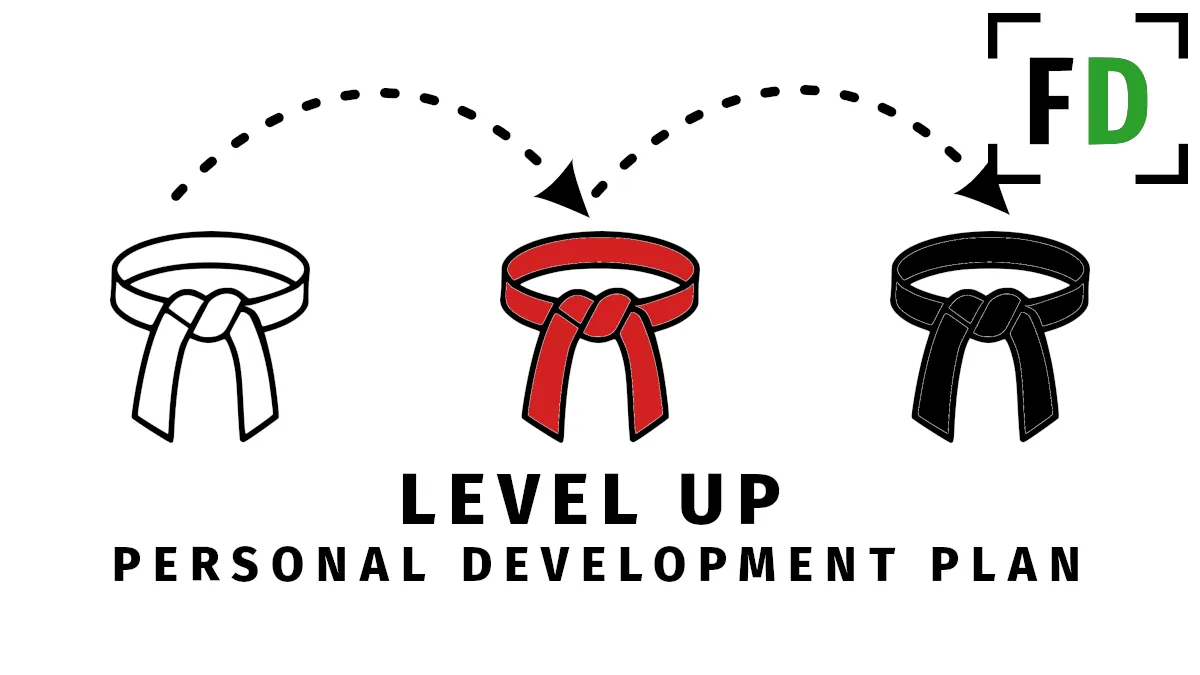I don’t often write articles like this, specifically directed at students, but these personal development ideas for students are more challenging to come by than they should be. Over the last ten years, I have consulted for hundreds of college-aged students looking for the ideal job or lifestyle. I saw the same issues in students from China, the U.K., the U.S., and all over.
They were motivated (they had paid for expensive consulting services) and had the time and energy to work on themselves. The question they asked me most often wasn’t “How do I do XYZ?” It was, “What should I do?”
My job as a career consultant was to tell them how to achieve their stretch goals, not what goals to set. I quickly realized I was wrong. Students today are overwhelmed with options; some lead to personal development, others don’t. But no one gives them a list of vetted personal development ideas, things that won’t be a waste of time.
So, I created this list of personal development ideas for students. Now, I’m turning it over to anyone who wants to develop themselves. I hope you find it useful.
Step One: Diversify Your Skillset
I get it. You’re studying law (or whatever) right now, and all you want is to become an expert in your field. It’s admirable. But tons of law students and lawyers are doing that, too, and some of them started decades ago.
I found this out the hard way. I studied Chinese in China. But I quickly realized that there were literally a billion people there who could speak Chinese. I needed to diversify my skillset. I spent my last year of college coding five hours every day. After graduating, my programming skills (not my Chinese skills) got me my first job in the IT department of a multinational biotech firm in Beijing.
Yes, there are tons of lawyers, but how many are also doctors? You can instantly imagine why the best law firms, hospitals, or insurance companies would want someone like that.
What about a lawyer who is also a chartered accountant, speaks a second language, or has a deep understanding of computer science? Same deal.
While you’re still at school, consider adding one of the skills below to your skillset; you’ll graduate a more competent and well-rounded candidate. Resist only reading a book. Get some real experience instead.
- Study a different discipline – Getting a graduate degree in a new field will differentiate you from other candidates in job applications.
- Learn the sales process and get sales experience in a part-time job. Companies care about sales more than any other department.
- Get real software development and testing experience with an open-source project. Don’t just “learn to code.”
- Photography – Set up a micro-studio at home and take headshots for your friends’ social media, or become an events photographer for free to gain experience.
- Artistic, illustration, or design – Build a portfolio showing your skills.
- Acquire a foreign language.
- Videography – A successful YouTube channel is better evidence of your abilities than a degree
- Documentary making or journalism – Writing skills are valuable and are evidence of a sophisticated mind.
Step Two: Task and Life Management
I reviewed, revised, and rewrote hundreds of resumes over the years. I saw this on almost all of them:
“Excellent time management and organization skills.”
But with only one or two questions, this always turned out to be a lie. I’d ask them, “What kind of task management system do you have?” I’d either get a blank stare or an attempt at an answer, something like, “I schedule my tasks on my calendar,” or, “I make a list of things to do each day,” But when I asked if I could see it or asked what they have on their list today, they admitted to rarely actually using their “system.”
It wasn’t that I wanted to catch them out. They really believed they had these skills, and I needed to show them they still needed work.
A simple list of personal goals you want to accomplish is a great way to start, it will give you direction and something to motivate you each day. But a task management system is really the gold standard.
The problem is that without task management skills, you will never be as productive as you could be. It will hold your entire career back. Without solid time management skills, you won’t be able to to diversify your skillset and practice the other personal development ideas on this list while also juggling your studies, career, and everything else.
So, you must perfect a task management system, not for your resume, but for your life.
Without a way to keep track of the tasks you have to do, you just won’t get them done. Ever keep telling yourself that you must do something but never actually get it done? “I need to buy batteries,” you think when the remote stops working. A few days go by, and the next time you pick it up, you instantly remember, “Oh, I need to buy batteries.” Weeks can pass without buying them, even though you’ve been to the store many times. How can something so simple slip through the cracks?
Your mind is designed to remember the essential things, the life and death things, or things that will prevent emotional pain. Everything else is incidental. So your mind just doesn’t care enough about most tasks. The solution is so simple, though.
Write it down.
It seems stupidly simple, but a list never forgets. A simple “Things to Buy at the Store” list is all it takes. You don’t even need to take the list with you. When you get to the store, your mind will think, “What was on that list,” and you’ll buy the batteries.
Making lists like “things to buy at the store” and ” things to do at work” might not seem very sophisticated, but it’s a great start.
The hardest part of building a system, whether it’s starting GTD, a bullet journal, or the Pomodoro Technique, is getting into the habit of writing things down; it requires a little humility because you must accept that your mind isn’t good enough to remember and organize your life. And it isn’t. Even after using GTD for over 15 years, I still avoid writing things down, thinking, “I’ll remember this.” (I never do.)
So, how do you choose a task management system? It only needs to have three things:
- A place to list to-dos
- A Place to schedule tasks
- Be accessible at all times
Maybe you chose a calendar and a list manager, but plenty of time management tools and apps can handle both. Being accessible means you probably want your system on your phone or a small planner you can carry around with you. I’ve used both. You can make either work.
Of course, many apps will give you many more features, like projects, goals, repeating tasks, and more. But if you only have a list and a calendar, you’ll be ahead of everyone else.
My minimal productivity system will get you up and running in minutes.
Step Three: Develop Your Interpersonal Skills
Like it or not, how well you get on with others will determine your success. If you’ve got a great product, but no one likes you, no one will buy it from you. If you’re the hardest worker in the office, but you’re awkward, you’ll never get promoted to team leader or department head. You won’t get hired if you’re the perfect candidate for a job on paper but come off as a jerk in the interview.
And it’s not only that basic interpersonal skills will keep you from missing out.
I worked the first job I got after graduating for about four years. I was pretty good at it, too. The guy who replaced me had no IT experience and no experience in the industry; he didn’t even speak Chinese (this was in Beijing). After one year on the job, he was promoted.
He wasn’t promoted to team leader, project leader, or manager; he jumped about four levels and became regional manager of another department!
How he managed it fascinated me, and I committed to working it out.
He made a conscious effort to befriend the other managers, but not in a slimy way. He went to the bar after work with them, joined the weekend softball team, and joined the charity runs. He just befriended them. Going to lunch together and being available.
When the regional manager position became available, everyone simply agreed that he would be great for the job.
He stayed in touch with me (interpersonal skills), and within three years, he was GM of an entire Chinese company. Social skills are important!
How do you improve your social skills? Here’s a roadmap
1. Start Networking Now
There is a straightforward way to become a better communicator: to become someone others enjoy being around and become someone that people listen to. But you can’t do any of it if you’re sitting alone at home.
Any time you leave the house, it’s a chance to network and practice. If you go to work or class each day, start there. If you don’t, or want more opportunities, join clubs, groups, and organizations that operate online and offline.
It doesn’t need to be a debate club or city council. You can develop your interpersonal skills at a martial arts class or photography walk, too.
Like most things, the more you practice, the better you’ll get, so start networking now.
2. Practice Active Listening
Active listening is a skill you can turn on and off. It is a superpower you can use when you communicate with anyone. People tell you all sorts of things, but most of it, you simply don’t notice.
Their body language tells you how they’re feeling
Their tone gives away their energy level
their facial expressions tell you if they believe what they’re saying
That’s all before taking into account what they are saying.
What are they trying to communicate (it usually isn’t simply what they’re saying)
Why are they saying this?
Here’s a simple exercise you can try next time you talk to someone you disagree with.
- Listen to their side of the argument intently and try to fully understand their perspective.
- Paraphrase and summarize their argument and ask them if that’s what they meant
- Then give your opinion
3. Find a Great Communicator and Immitate Them
You already know some great communicators; they may be celebrities, politicians, intellectuals, or someone you know in real life. Whoever it is, pay attention to what it is they do. If you can find a video of them speaking online, watch it over and over.
Watch their body language, listen to the pace they use to talk, listen to the inflection (does their voice go up and down?) Think about the volume. Finally, listen to the words they use.
Try to memorize a small section of them speaking and imitate them. You will learn something.
There’s no “one way” to be a great communicator, so try imitating some different people until you find someone that feels right for you.
Churchill, for example, spoke in simple everyday words and commonly used a low inflection at the end of sentences for emphasis.
“We shall fight them on the beaches we shall fight on the landing grounds, we shall fight in the fields and in the streets.”
A modern example is Jordan Peterson, who is also a great communicator. However, he uses complex language and emphasizes volume. One thing that Jordan does exceptionally well, however, is that he uses active listening. When someone is speaking, he focuses intently and listens to exactly what the person is saying.
Then, he responds to what the person is actually talking about instead of just waiting for his turn to speak and talking about anything he likes.
4. Write a Diary or Journal
This powerful exercise will change your entire perspective on effective communication, but only if you do it.
- Choose a complex issue you haven’t studied in depth but know something about (like a recent political or philosophical issue or something you’re going through in your life.)
- Take out your smartphone and film yourself talking about it for 5 minutes.
- Now, go get a notebook or your laptop and spend an hour writing about the same topic.
- Pull out your smartphone and film yourself again for 5 minutes.
Writing forces you to think more deeply, make stronger arguments, and discover connections that point to conclusions you simply can’t make in your head on the spot. The brain has difficulty grasping and analyzing multiple complex ideas simultaneously. It doesn’t have enough mental RAM to do it.
By writing them down, the brain can focus on one thing at a time – the sentence you’re writing – without needing to hold on to everything else too.
It sometimes looks like people in the media can speak effortlessly and eloquently (and some really can), but frequently, these speakers have had years honing their ideas through writing.
5. How to Make People Listen
Start strong.
“I was gonna go down the street to get lunch, but I thought I’d walk through the car park today, and when I was there, I saw a guy giving away free ice cream.”
“There’s a guy giving away free icecream outside!”
In journalism (the art of getting people’s attention,) they call this burying the lead. It’s the best way to make people tune out, whether in writing or face-to-face. So start strong.
It shows you value the reader or listener’s time. Staying clear and concise makes people want to listen to you and makes you more understandable. The last thing you want is someone walking away, not knowing what you were trying to say.
The best tool I’ve ever used to learn this is Grammarly. Check out Grammarly. It will turn a sentence like “I feel as though I would be able to get to grips with the software the role demands” into “I believe I can quickly learn and understand the required software for the job.”
6. Read Books on Communication
- How to Win Friends & Influence People
- Talk Like TED: The 9 Public-Speaking Secrets of the World’s Top Minds
Step Four: Learn Specific Software
Not all software was created equal; learning Excel properly will be much more useful than knowing the software for making and scanning barcodes like BarTender. But, almost every resume I ever got proclaimed proficiency with Excel, and I never saw a single one with BarTender experience.
Now, I don’t recommend you go out and learn how to use BarTender, but you should know some software that distinguishes you from everyone else, even if that means it’s outside your industry. Diversify, remember?
General Office Software
- Word
- Excel
- PowerPoint
- Outlook
- SharePoint
- M-Files
- DocuWare
- Google Docs
- Google Sheets
- Google Slides
- Gmail
- Slack
- Microsoft Teams
- Zoom
- Skype for Business
- Microsoft Whiteboard
- Miro
Task and Project Management
- Microsoft Project
- Asana
- Trello
- Jira
- Jira Agile
- VersionOne
- Rally (formerly CA Agile Central)
Sales and Marketing
- Salesforce
- HubSpot
- Zoho CRM
- Adobe Creative Cloud (Photoshop, Illustrator, InDesign)
- Canva
- Sketch
- Google Ads
- Microsoft Advertising (formerly Bing Ads)
- Facebook Ads Manager
- Shopify
- WooCommerce
- Magento
- Adobe Premiere Pro
- Final Cut Pro
- iMovie
- Marketo
- Brandwatch
- Mention
- Talkwalker
- Hootsuite
- Buffer
- Sprout Social
- Mailchimp
- Pipedrive
- SalesLoft
- Moz
- SEMrush
- Ahrefs
HR
- Zendesk
- Freshdesk
- Help Scout
- Workday
- BambooHR
- ADP
- SAP SuccessFactors
- Oracle HCM Cloud
Finance and Accounting:
- QuickBooks
- SAP ERP
- Oracle Financials
- Bloomberg Terminal
- SAP
- Oracle ERP Cloud
- Microsoft Dynamics 365
- SAP SCM
- Oracle SCM Cloud
- JDA Software
Design
- AutoCAD
- SolidWorks
- CATIA
- Blender
- Autodesk Maya
- Cinema 4D
- ANSYS
- Abaqus
- COMSOL Multiphysics
- Fusion 360
- Mastercam
- Rhino
Quality Assurance
- Selenium
- JUnit
- TestRail
Data Analysis and Visualization:
- Tableau
- Google Analytics
- Power BI
- MySQL
- Microsoft SQL Server
- Oracle
- R
- SAS
- SPSS
- RStudio
- KNIME
- Alteryx
- Looker
- QlikView
- Sisense
Web Development:
- WordPress
- Wix
- Squarespace
- Joomla
- Drupal
IT
- Git
- GitHub
- Bitbucket
- Wireshark
- Metasploit
- Nessus
- VMware
- VirtualBox
- Hyper-V
- Android Studio
- Xcode (for iOS)
- Amazon Web Services (AWS)
- Microsoft Azure
- Google Cloud Platform (GCP)
- Docker
- Kubernetes
- Jenkins
Knowledge Management:
- Confluence
- Notion
- KnowledgeOwl
- Obsidian
- Logseq
Step Five: Physical Fitness that Will Last a Lifetime
How often have you heard an overweight guy in his 40s say something like, “I used to play college football.”? Or “I haven’t exercised since high school gym class”?
Next, they usually start reminiscing about how good those times were. And when you ask why they don’t play anymore, they hit you with the oldest excuse, “I’m too old for that now.”
They’re right; playing football into your forties or fifties probably isn’t a great idea.
- You get injured more easily
- Where will you find two teams of older guys who want to play?
- Even if you find them, how often will they want to play? Not enough to get in your daily exercise.
It’s true of many sports. Sports are great when you’re at college, and everything is organized for you. But years later, when you have a full-time job, family commitments, and other things on your plate, will you want to organize a baseball match for you and your buddies? Are you going to maintain a boat for the rest of your life so you can keep rowing?
No, you can still play the sports you like, but you must pick something that will last a lifetime and that you can do every day to stay mentally and physically fit.
Here’s what you need:
- Something you can practice alone
- Something that you can continue into old age
- Something that is widely available
If you can hit two out of three, you have a great choice to keep you fit for the coming decades. Here are a few options.
- Running
- Swimming
- Cycling
- Yoga
- Martial Arts
- Hiking
- Lifting Weights
- Tai Chi
- Juggling
Step Six: Spiritual Development
Most of you will skip straight past this section, but those who are reading and put into practice will gain something more valuable than mere Photoshop skills or six-pack abs. Real personal growth.
What should you do when your boss does something shady? Or when you wake up every day not knowing what you’re living for? What can you lean on when you feel emotionally drained or feel like you just don’t want to go on anymore?
There are many gifts spiritual development can offer. I want to focus on three:
- A Sense of Purpose
- Morality
- Greater Resilience and Improved Emotional Well-being
Not too long ago in human history, everyone had some sort of religious affiliation; it came with the culture they were born into. That religion automatically gave them the three pieces of spiritual development above.
Now that most people have no religious affiliation, it’s up to them to manufacture a sense of purpose, a moral framework, and a mindset or support system to help when times are hard.
That’s not an impossible task. People may find purpose in their children, decide on an ethical philosophy like utilitarianism, and attend weekly therapy sessions to sustain emotional well-being.
But Christians, like George Farmer, said his father would often tell him that “Being a Christian is a massively unfair advantage,” and it doesn’t take much to understand why.
Belief in an unending, unchanging God gives a more permanent sense of purpose than a child who will eventually leave to start their own life.
When a moral philosophy is given to you, it saves you the struggle of deciding the right thing to do.
And when you’re confident in the reason for your struggles, it makes it easier to keep going despite them. Studies have shown that religious people are better equipped to deal with emotional and mental struggles.
While there are many paths to spiritual development, you should first look closely at the spiritual traditions of your culture. With centuries of development, it likely has what you need.
Want More Personal Development Ideas?
There is a source of personal development ideas for students that is custom-made and will tell you exactly what you should learn to get the job you want.
The Job Description
Go to any job site like Glassdoor or Indeed and search for your desired job. Look at the job requirements and responsibilities. You’ll find a list of every skill you should learn and experience you must gain.
Don’t stop there. Now, look at the job you want to get in five years’ time and figure out how you can start learning those skills, too.
By combining what is in the job descriptions with a solid productivity system, interpersonal skills, specific software, a good fitness level, and a purpose for wanting it all, you’ll be unstoppable after graduation.






